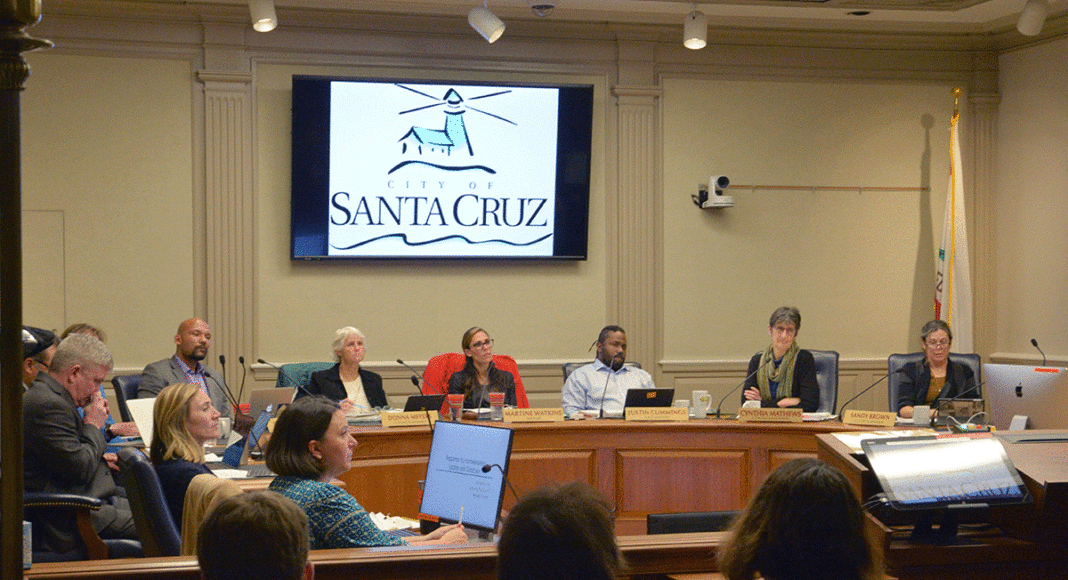EDITOR’S NOTE

Earlier this year, Jacob Pierce did a cover story on accusations of sexism and bullying at Santa Cruz’s City Hall. There was a wide range of reactions, but many could be summed up by the reader who wrote, “Reading this article, I found myself shaking my head at the petty, immature antics of the Santa Cruz City Council.”
Chris Krohn and Drew Glover were the two councilmembers at the center of the controversy. While Krohn struck an apologetic note at the time, Glover was defiant, calling the accusations “laughable.” That didn’t quiet the brewing storm, and talk of a recall effort against both politicians began soon after.
It’s hard not to think about the new report on the complaints against Krohn and Glover in the context of that potential recall. In this week’s cover story, Pierce returns to the topic to analyze the report’s findings and consider what supporters and detractors of the embattled councilmembers are likely to take away from it. Perhaps most importantly, his story looks at the bigger question hanging over all of this infighting: where do we go from here?
LETTERS TO THE EDITOR
Read the latest letters to the editor here.
Race and ‘The Winter’s Tale’
Re: “Slipping Through Time” (GT, 8/14): So let’s talk about the elephant in the room. Black American directors are hardly ever associated with Shakespeare, and Black female directors taking on Shakespeare are even more rare. With that said, the existence of an adequate platform to discuss director Raelle Myrick-Hodges’ choices in The Winter’s Tale is essential. At opening night, I was blown away by the nuanced ways in which she skillfully navigated a deeply intentional subtext of race and power in her strategic placement of characters and blocking. The weight of representation was palpable, the comparisons to an American legacy of racism which haunts us today as a national emergency, unmistakable. It would be a huge loss to not be able to see, understand or acknowledge her work, and demonstrates how one’s position in society dictates what is visible to one’s conscience.
To start, we begin the play in the 1940s because it represents a time of illusory, whitewashed glamour that fails to cover the horrors of lynching and Jim Crow racism. We cannot ignore the sinister pull of Hermione’s (Karen Peakes) white womanhood as she insists that a Black King Polixenes (Lindsay Smiling) stay as her “guest or prisoner.” The imminent danger to Polixenes fills the stage as we watch King Leontes (Ian Merrill Peakes) become psychotically consumed by jealousy and rage at the thought of Polixenes having touched his queen. In this moment, Myrick-Hodges draws clear references to Emmett Till, and the historically violent obsession with perceived transgressions against white womanhood by Black men, itself a byproduct of the legacy of slavery and the making of American capitalism.
Leontes cannot be convinced otherwise, and goes on to wreak havoc and ruin in the lives of his most beloved relationships. His tyrannical ideology, his privilege and entitlement being centered at all costs, smacks so clearly of our current president that it’s almost funny, until one considers the real atrocities being visited on mothers and children at this very moment. Leonte’s disgust at the thought of Polixenes being the father of the baby in Hermione’s womb oozes with eugenic rage. At the same time, the refusal of Lady Paulina(Chavez Ravine) to come to Hermione when called and her silent, yet powerful, confrontational stance towards Leontes are an allegory for the historical resistance of Black women as the collective conscience of America, even while being reviled and shunned.
In short, the directorial choices being made by Myrick-Hodges are both nuanced and pointed as they invite us to unpack a tangled web of jealousy, patriarchal ownership and vengeance for perceived adultery, as it relates to race. The fact that none of these choices have been touched upon by any reviewer of this production of The Winter’s Tale is an example of how the realities of Black American lives are still largely misunderstood and unacknowledged. If we are asking Black female directors like Raelle Myrick-Hodges to produce plays by William Shakespeare, we owe it to the work to insure their choices are centered, discussed with critical thought, intersectional analysis, and their intentions made perfectly clear to reviewers and theater patrons alike.Representation is important, and it’s easy to feel good about providing it. Looking at our own privilege, entitlement and patriarchy is more difficult to do, but it’s the only way that we can move forward. I commend Myrick-Hodges for pushing us towards waking up.
D’mitra Smith
Sonoma
When reached for comment about this letter, Director Raelle Myrick-Hodges said, “It’s hard not to have an emotional reaction to being seen.” She also said she found Santa Cruz Shakespeare to be a “safe space” for creating the vision she wanted. ‘The Winter’s Tale’ is in its final week; it closes Sept. 1. — Editor
PHOTO CONTEST WINNER

Submit to ph****@*******es.sc. Include information (location, etc.) and your name. Photos may be cropped. Preferably, photos should be 4 inches by 4 inches and minimum 250dpi.
GOOD IDEA
The Santa Cruz Water Department has completed fieldwork for the first pilot study of aquifer storage and recovery, also known as ASR, at its Beltz 12 well facility. The citizen-led Water Supply Advisory Committee recommended ASR as a way to bank excess winter surface water in depleted underground aquifers for future use during dry conditions. Recharge could play an important role in the county’s local water supply, and signs are so far encouraging. The study’s final results will be available this fall.
GOOD WORK
The Institute for Local Governments has awarded the city of Santa Cruz a 2019 Beacon Award for Energy and Emissions Reductions. The Beacon Program supports and recognizes action by California local governments to address climate change, promote energy innovation and create more sustainable communities. The program recognized Santa Cruz for its greenhouse gas emission reductions, energy savings and sustainability best practices.
QUOTE OF THE WEEK
“Mayors, city council members, and legislators come and go, but neighborhoods don’t go anywhere.”
-Rashida Tlaib













